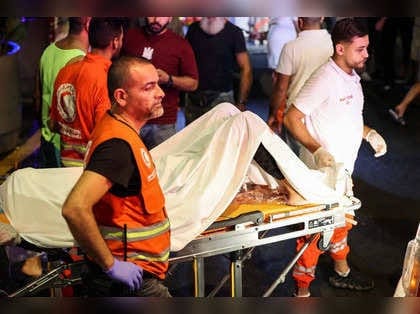Panic grips Lebanon as explosive attacks target everyday devices
As Lebanon grapples with the aftermath of a devastating wave of pager bomb attacks, a new wave of terror has struck, leaving the nation in shock and fear.

As Lebanon grapples with the aftermath of a devastating wave of pager bomb attacks, a new wave of terror has struck, leaving the nation in shock and fear.
On Wednesday, as mourners gathered in Dahiyeh, a Hezbollah stronghold in southern Beirut, a fresh explosion sent panic through the crowd, already mourning the loss of an 11-year-old boy and three Hezbollah members killed the day before.
In a video capturing the blast, chaos unfolded as people scrambled for safety, moments before funeral services were set to begin. The explosion sent a chilling message: no electronic device is safe.
Also Read: Japanese firm denies links to explosive walkie-talkies used in Lebanon blasts
The terrifying notion that walkie-talkies, after pagers, were now being targeted led to widespread paranoia. In Dahiyeh, Hezbollah supporters, gripped by suspicion, repeatedly stopped journalists, fearing cameras and phones could be detonated. The atmosphere of uncertainty escalated further when rumors on social media suggested even solar panels might be exploding.
Reports from Lebanese officials paint a grim picture—20 people killed and over 450 wounded in a series of explosions that set homes, shops, and vehicles ablaze. Many fear this is just the beginning of a wider conflict, as Hezbollah struggles to regain control after what many see as a strategic humiliation. The attack on their communication systems has raised serious concerns about Israeli infiltration.
A devastating attack on Tuesday targeted thousands of pagers, killing 12 people, including two young children, and injuring nearly 2,800. Victims were caught unaware in shops and homes as the devices exploded after receiving a deceptive message believed to be from Hezbollah.
“Everyone is just panicking,” said Ghida, a Beirut resident who spoke to the BBC’s *Newsday*. “We don’t know if we can stay next to our laptops, our phones. Everything seems like a danger at this point and no one knows what to do.”
Her fear is shared by many, as Lebanon teeters on the edge of a wider conflict. “I am afraid of a wider-scale war in Lebanon,” Ghida continued. “I’m afraid for my people, my city, and my country.”
Dr. Elias Warrak, who treated many of the wounded after Tuesday’s attacks, painted a harrowing picture of the injuries. “At least 60% of the people I saw had lost at least one eye. Some lost fingers, others lost entire hands,” he said, describing it as “the worst day of [his] life as a physician.“
It is believed that the pagers were rigged with explosives and distributed by Hezbollah, who had warned that smartphones were being used by Israel to track and kill their members. How these latest walkie-talkie explosions were carried out remains unclear, but Hezbollah has already pointed the finger at Israel, vowing revenge.
As tensions escalate, fears of an all-out war between Hezbollah and Israel grow. Israel has not commented on the latest attacks, but its Defense Minister Yoav Gallant warned that the country is entering “a new phase in the war.”
Despite Lebanon’s ongoing economic crisis, Hezbollah’s leader Hassan Nasrallah may soon offer clues about the group’s next move in his anticipated speech on Thursday. In the meantime, residents of Beirut and southern Lebanon are left grappling with fear and uncertainty, unsure of what’s coming next.
For now, electronic devices have become symbols of dread in a country already fractured by political, economic, and social turmoil.










